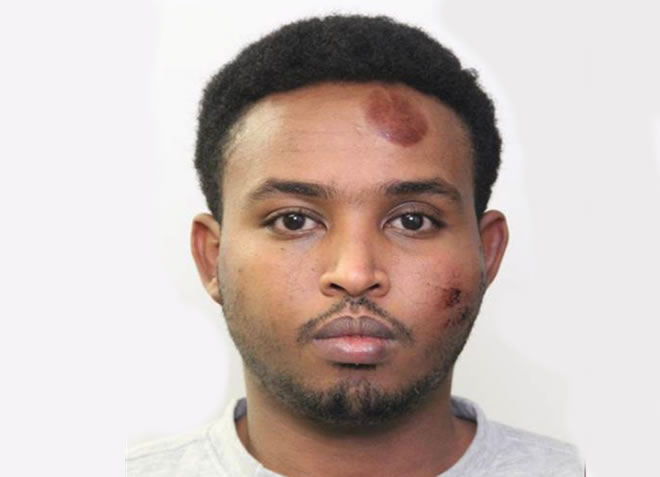Canada defended its immigration and refugee vetting system on Monday after a Somali immigrant, who had drawn scrutiny for his alleged extremist views, was charged with attempted murder for a weekend vehicle and knife attack that injured five.
Abdulahi Hasan Sharif, 30, is accused of running down a police officer with his car in Edmonton, Alberta, and then stabbing him repeatedly. He then ran down four pedestrians during an attempt to evade capture.
Sharif faces 11 charges including five for attempted murder linked to the rampage in the western Canadian city on Saturday night and police said more charges could be laid.
He came to Canada in 2012 and was granted refugee status in the same year, Public Safety Minister Ralph Goodale said.
Though targeted in a probe two years ago for promoting extremist ideology, Sharif was deemed to pose no threat after what the Royal Canadian Mounted Police (RCMP) described on Sunday as an “exhaustive investigation.”
Goodale said it would be wrong to blame the attack on any shortcomings in Canada’s immigration and refugee vetting system.
“There’s absolutely no evidence of that whatsoever. The investigation is ongoing, but that conclusion is just not supported by the facts,” Goodale told reporters in Ottawa.
Still, the attack could leave Prime Minister Justin Trudeau open to more criticism from conservatives for the welcoming message he extended to refugees earlier this year, after U.S. President Donald Trump issued a travel ban targeting several Muslim-majority countries.
Canada has seen a surge in illegal border crossings this year as people fearing a U.S. immigration crackdown and possible deportation sought asylum.
Opposition Conservative parliamentarian Michelle Rempel said the incident raised questions about how police and immigration officials share information.
“If there are gaps in the system that allowed this to happen, what are we going to do to fix those?” Rempel asked in comments to Reuters.
Edmonton’s refugee and Somali communities are bracing for a backlash in the wake of the attack, and met on Monday to discuss how to move forward, said Ahmed Abdulkadir, executive director of the Ogaden Somali Community of Alberta.
“We’ve been receiving phone calls from moms asking us what to do” and whether it’s safe to send their children to school, Abdulkadir said.
Sharif’s bail hearing was delayed until Tuesday but police released a photo of Sharif taken after his capture, showing a young man gazing directly at the camera, a large bruise on his forehead.
Karen King, one of Sharif’s neighbors in an Edmonton, said he kept to himself and lived alone. Another, Jeff Dearman, said he played loud music and chanted sometimes.
“It was all normal other than that,” Dearman said.
Two of the four people injured on Saturday remained in hospital, with one listed in serious condition, RCMP Superintendent Stacey Talbot told a news conference.
Despite the incident, Canada’s government said it was keeping the terrorism threat level at medium, where it has been since late 2014 after two deadly attacks attributed to homegrown radicals. The incidents led to tougher new anti-terrorism measures.
In October, 2014, a gunman killed a soldier at Ottawa’s national war memorial before launching an attack on the Canadian Parliament. In the same week, a man ran down two soldiers in Quebec, killing one.
Additional reporting by Andrea Hopkins in Ottawa, Nia Williams in Calgary and Anna Mehler Paperny in Toronto, Writing by Andrea Hopkins; Editing by Tom Brown
By Ethan Lou
![]()































